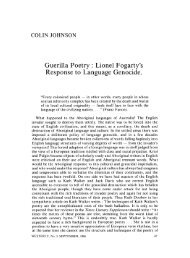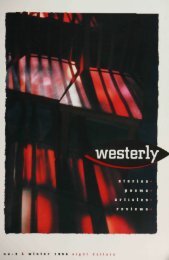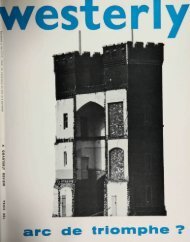quite diverse traditions towards the one ideological disapproval. "I hate the term",Buckley said.24 He hated it for the sound pragmatic reason that it was meaninglessin conveying anything he knew or felt true about being Irish in Australia. Whatis transgressive about Buckley is that he is less manageable than most otherAustralian poets I've read, manageable in that sense of being contained either byfashion or reaction against fashion, or contained by what we may previously haveread of him. Put together those three books of his most important years, The GoldenBuilders of 1976, and The Pattern and lAte Winter Child both in 1979, and youhave, to begin with, work of remarkable technical deftness, poems impressive intheir grasp not of life - I'm not loading him with simply mirroring anything -but of how much lived experience he fmds resonant patterns to propose. These arevolumes that encompass without fuss, without the drumbeat of rhetoric he came soto distrust, five hundred years of racial history, nine months of family and sexualhistory, and the presence of the city that was closest to him, all within that drivefor coherence, and the response to diverse events when coherence fails to gel. I wouldargue that The Golden Builders in its deliberate linkages with Blake, with Baudelaire,with Whitman, is an odyssey from post-colonial ironies to an aCceptance of lost faith.The first poem's incanting the names of Melbourne streets which are also the namesof nineteenth century British aristocrats and patrons, the murmuring of name uponname in a way which is quite the reverse of Yeats's celebrated instance, introducesthe sequence's general tone of discomfort and dislocation.o Cardigan, Queensberry, Elgin; names of their Lordships,Cardigan, Elgin, Lygon: shall I find here my Lord's grave?The twenty-seventh and last poem concludes with a similar question, and withBuckley returning to where he was born.We are travellingtowards my timber birthplaceand the wilderness of flies . . .and the dogs paused above the creek.And my Lord's grave? His grave?That conclusion is the reverse, and I suspect deliberately the reverse, of the lastof his "Eleven Political Poems" written ten years before, in a context one might sayof assumed and still accepted certainties, verse that celebrated... movements of the earth that bring meIn constant pilgrimage to Genesis,To the bright shapes and the true names,Oh my Lord.25For all the implications of The Golden Builders as a title, it is a poem not ofstructures and enacted order, but an exercise in replacement, displacement, "earthshaken from the root/ or marrow from the bone". It is a poem of empty empire,emptying memories, a vanishing city and its communal rapport, an emptied faith,a refusal of possibilities let alone certainties. Which is why The Pattern and lAteWinter Child must be read as its antistrophe, the resurrected possibilities of bothchild and parent, poems that are a way back from "the wilderness of flies", andconstructed from the absences of the earlier work.56 WESTERLY, No.2, JUNE, 1989
Believing nothing, I could hopeto see, not a god, but a child,a place : sunrise : a whistle : bird on stem:a low sky, downy with rednesses.(XXV, 5)Systole and diastole, then, to use words Buckley took up in more than one poem,one thing passing rhythmically and naturally into another, and the poet replicatingthat, the rhythm of life in the rhythm of the voice that speaks it. Yeats, the strongestof his "singing masters", at the end of his life offered the advice that the best ofBuckley bears out: a passion for "the well made", an indomitability of race and itsexpression, not through chauvinism, and not through easy sentiment, but by meansof constant, lucid attention to events, and to how we speak of them.NOTESI. 'Persona : The Empty Mask", an exchange of views with Canadian scholar Robert Wilson, Quadranl, November 1975, p.93.2. See various chapters in the New literary Hislory of Australia, 1988: Bruce BeMett, 'Pen:eptions of Australia, 1965.19SS", pp. 444.445;Judith Brett, "Publishing, Censorship and Writers Incomes, 196s.1988", p.454; Brian Matthews, "Literature and Conflict", p.3IS;James Tulip, "Poetry since 1965", p.48S; Chris Wallace-Crabbe, "Autobiography", p.S69.3. Maslers in Israel, 1961, pp.27, 29.4. From an unpUblished interview with Vincent O'Sullivan in 1985.S. A remark made to Dr Frank McKay.6. "Specifying the Sacred", in Poelry and lhe Sacred, 1968, p.6.7. The World~ Flesh, 1954, p.46.8. O'Sullivan interview, 1986.9. "Vincent Buckley: an interview with Elizabeth Booth." The Bergson argument can be found in his L'Evolulion Crealrice, 1907.10. "Magic", in Ideas of Good and Evil, collected in Essays, 1924, p.33.II. Suzanne Langer, Philosophy in a New Key, 1942, p.lSI.12. Cited DaedoJus, Sprin~ 1959, p.231.13. Elizabeth Booth inlervlew, p.30.14. O'Sullivan interview.IS. Buckley in conversation expressed his agreement with Edward Said~ view that we cannot disregard a text~ claim on actuality, thattexts "are always enmeshed in circumstance, time, place. and society - in short. they are in the world, and hence are worldly," "'TheText, the World, the Critic", in Texlwl Slralegies, edited JosUe V. Harari, 1979, p.l6S.16. Poetry and lhe Sacred, p.II, p.W.17. Elizabeth Booth interview, p.28.18. Interview with Henry Rosenbloom, Mean;in QuDrterly, September 1969, p.32S.19.2a.Elizabeth Booth interview, p.31.Philosophicallnvesligalions, translated G.E.M. Anscombe, 1958, t, paragraph 43; On Orlainly, translated Dennis Paul and G.E.M.Anscombe, 1969, paragraph 249; both cited in Austin E. Quigley, "Wittgenstein~ Philosophising and Literary Theorizing", New literaryHislory, Vol. 19, No.2, Winter 1988, p.220, p.224.21. See "w'B. Yeats and the Sacred Company", Poelry and lhe Sacred, pp.J72·2U4.22. Frank KellIlOSle, Hisloryand Value, 1988, p.99.23. Samuel C. Wheeler III, 'Wittgenstein as Conservative Deconstructor", New literary Hislory, Winter 1988, p.2SS.24. O'Sullivan interview.25. "Day with its Dry Persistence", in Arcady and Other Places, 1966, p.S6.WESTERLY, No.2, JUNE, 1989 57
- Page 3 and 4:
CONTENTSWESTERLYVOLUME 34, No.2, JU
- Page 5:
WESTERLYa quarterly reviewISSN 0043
- Page 8 and 9: JAN KEMPTo My Father, M.H.K.My fath
- Page 10 and 11: JAN KEMPThe GypsySuddenly before yo
- Page 12 and 13: WONG PHUI NAMA Death in the WardThe
- Page 14 and 15: WONG PHUI NAMCousinI had to call to
- Page 16 and 17: WONG PHUI NAMObitIt is as thin smok
- Page 18 and 19: So thus I lie here fearful of movem
- Page 20 and 21: VIRGINIA BERNARDA ValedictionWhen N
- Page 22 and 23: "Yeah, yeah," I call, returning the
- Page 24 and 25: she flops for a bit, slurps her tea
- Page 26 and 27: well her students did, she was neve
- Page 28 and 29: English or Indian, that they had th
- Page 30 and 31: ANDREW TAYLORSpringSpring is a dive
- Page 32 and 33: CAROL SElTZERAiming for the MouthTr
- Page 34 and 35: GRAEME WILSONA Selection of Japanes
- Page 36 and 37: a highly ambivalent attitude to his
- Page 38 and 39: Esson attended some rehearsals of T
- Page 40 and 41: the literary life of Bloomsbury. Lo
- Page 42 and 43: Without Yeats Esson would quite lik
- Page 44 and 45: "What theatre do you have in Austra
- Page 46 and 47: In the back room Esson could feel t
- Page 48 and 49: "When we started our little theatre
- Page 50 and 51: a screen against a wall. A theatre
- Page 52 and 53: VINCENT O'SULLIVANSinging Mastery:
- Page 54 and 55: flighty relation in most statements
- Page 56 and 57: living and the dead; that places hi
- Page 60 and 61: WARRICK WYNNEThe Wetlands (for Liam
- Page 62 and 63: JAN OWENSmileOur mother aimed the b
- Page 64 and 65: RICHARD KELLY TIPPINGOlympic Airway
- Page 66 and 67: DAVID REITERBear by the Jasper Road
- Page 68 and 69: (At twenty eight you did not bother
- Page 70 and 71: left, would have risen and walked o
- Page 72 and 73: He had hair like mine used to be, t
- Page 74 and 75: OLIVE PELLThe QuestionTell me how t
- Page 76 and 77: BRIAN MOONANAT 515: MASS LECTURE Th
- Page 78 and 79: PETER KIRKPATRICKTear HereThe bay i
- Page 80 and 81: JOHN WINTERThe Bird ManIn wooded, p
- Page 82 and 83: KNUTE SKINNERAugust 15There's a lig
- Page 84 and 85: M.E. PATTI WALKERThe Hook"Aren't yo
- Page 86 and 87: QMNQMNQMNQMNapartheid man, this is
- Page 88 and 89: QMNQMNQMNeasy because you don't bel
- Page 90 and 91: lands or which have been taken over
- Page 92 and 93: GEOFF GOODFELLOWToo MuchDianne is 1
- Page 94 and 95: SHANE McCAULEYSouth Fremantle, Summ
- Page 96 and 97: JEAN KENTWaiting Out the DroughtWai
- Page 98 and 99: STEPHEN MAGEEJesus Falls, South Aus
- Page 100 and 101: SIMON BROWNBlue Hole, Santothe colo
- Page 102 and 103: CONAL FITZPATRICKA Brown Dog, Off A
- Page 104 and 105: PAUL HETHERINGTONOne RoomIn teeming
- Page 106 and 107: society, or, in the terms of the my
- Page 108 and 109:
emphasised (I think) in the referen
- Page 110 and 111:
Summer Leaves". This continues the
- Page 112 and 113:
Deficiency Bill in Western Australi
- Page 114 and 115:
invocation of pastoral near the beg
- Page 116 and 117:
particularly dreaded). The final re
- Page 118 and 119:
VINCENT O'SULLIVAN - is one of New







